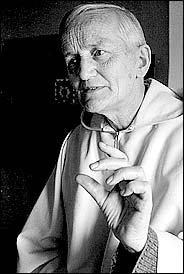The Incongruity of a Violent Death

The report in the New York Times was crisp, but blood-chilling:
PARIS (AP) -- "A Romanian woman slipped into a choir of singing monks during an evening prayer service and fatally slit the throat of the 90-year-old founder of an ecumenical Christian community in the presence of 2,500 horrified pilgrims in Burgundy, authorities said Wednesday. The slaying Tuesday of Brother Roger in the Church of Reconciliation drew reactions of shock and grief from the pope, the leader of the Anglican Church and worshippers around the world. "
For those of us who have admired the work of Brother Roger and the community at Taize, the news seems almost surreal. Known for his work in harboring Jews during World War II, the means of death appeared beyond belief. I suppose, having lived through a summer of violence not only in Bagdad but in London, as well, such a thing should not seem out of the ordinary. For those who have seen the "sacred spot" in Canterbury Cathedral where the "Death of the Archbishop" (Thomas a Becket) took place beneath the swords of a monarch, it suggests something of an age-old ritual.
Perhaps, in some ways, being murdered while singing the Psalter is not such a bad way to go. I read recently of a woman who had nightmares because the last sight she had of her dying husband was of him slumped over after having fallen off the toilet with his trousers draped around his feet. As a teenage orderly, I watched many a man die with tubes protruding from his body, his chest carefully shaven of body hair to accomodate the sensors for the EKG machine. Men used to power and prestige were oftentimes reduced to urinating in a small plastic container so that I could carefully measure output, as well as input. Death and dehumanization, whether violent or otherwise, oftentimes seem to go hand-in-hand.
But there is something particularly galling about the violence of a cold blade swept across the neck of an elderly man of God, who has given his life on behalf of others. I wonder, was he whispering to himself, like Jesus on the cross: "Father, into thy hands I commit my spirit"? We Protestants oftentimes find ourselves squirming when it comes to such things as prayer for the dead. But, for Brother Roger, today, I do pray that God will not only accept such a servant on our behalf of our fervent prayers, but that He will continue to bless the ministry of the community he leaves behind which represents more appropriately a humble monk's "remains".


<< Home